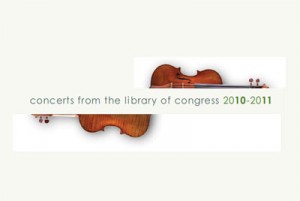 My colleague on the Library of Congress blog just waxed eloquent on the storied history of the Coolidge Auditorium. I’ve seen some great shows on that hallowed stage; although I’ve gravitated to the jazz shows, like Cecil Taylor and James Carter, The Mingus Big Band and John Zorn’s Masada, I’ve also spent memorable evenings there listening to country legend Dolly Parton, and the group Newband, performing on Harry Partch instruments to accompany a screening of F. W. Murnau’s silent classic The Last Laugh. Earlier this year I heard wonderful performances by Tracy Chapman and Alan Bergman at the ASCAP celebration; and of course there was this gentleman named Sir Paul McCartney.
My colleague on the Library of Congress blog just waxed eloquent on the storied history of the Coolidge Auditorium. I’ve seen some great shows on that hallowed stage; although I’ve gravitated to the jazz shows, like Cecil Taylor and James Carter, The Mingus Big Band and John Zorn’s Masada, I’ve also spent memorable evenings there listening to country legend Dolly Parton, and the group Newband, performing on Harry Partch instruments to accompany a screening of F. W. Murnau’s silent classic The Last Laugh. Earlier this year I heard wonderful performances by Tracy Chapman and Alan Bergman at the ASCAP celebration; and of course there was this gentleman named Sir Paul McCartney.
Such is the variety of musical experience that can be had at the Coolidge Auditorium, and as the 2010-2011 Concert Season shows, this year will be no exception. Highlights include:
- Period instrument groups Ensemble 415, The English Concert, and Helsinki Baroque–plus recitals by harpsichordist Trevor Pinnock and gambist Paolo Pandolfo
- The Salzburg Hyperion Ensemble, playing string sextets by Brahms, Strauss, and Schoenberg
- An all-Rachmaninoff recital by Gautier Capuçon and Gabriela Montero.
- Rare solo recitals by a pair of master jazz pianists: Brad Mehldau and Martial Solal.
- Tanya Tomkins plays the complete Bach suites for unaccompanied cello
- Three short film festivals in the Mary Pickford Theater, on pop, jazz, and film music
- A great spring season of new music, featuring Antares, Wordless Music Orchestra, eighth blackbird, Colin Jacobsen and Bruce Levingston, and the NOW Ensemble and Victoire
- Critic Greil Marcus, author of Lipstick Traces: A Secret History of the 20th Century, lecturing on “Sam McGee’s Railroad Blues and Other Versions of the Republic.”
View the entire season here (pdf), and download our concert brochure here (pdf).
